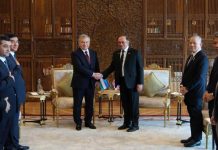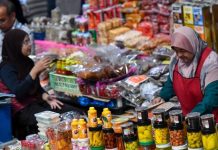The Small and Medium Enterprises Association Malaysia (SAMENTA) has proposed several initiatives for Budget 2022 in an effort to jumpstart the economy negatively affected by the COVID-19 pandemic.
SAMENTA Central Chairman who’s also the Chairman for SAMENTA’s Policy and Government Relations, Datuk William Ng said the pandemic has created a severe liquidity crunch for small and medium enterprises (SMEs).
“Even if the numbers from the banks may not reflect this, it is felt acutely on the ground and will be debilitating in the recovery phase. The fear of default is real, so most suppliers have tightened trading terms. If SMEs on the rebound can’t get supplies and raw materials, there is little hope of a SME-driven or SME-supported recovery,” he said in a statement.
Therefore, the focus should also be on businesses and not just consumption, said Ng noting that the road to recovery is as much about stimulating demand from businesses as it is from consumers.
Just as consumer confidence is important, investors’ confidence (including domestic investors) is equally important. In order to support the recovery of SMEs and to regain the lost ground, SAMENTA has proposed the following initiatives for the upcoming Budget 2022:
- Stimulating consumption; the M40 is the segment with the propensity to spend and have been impacted by the pandemic. SAMENTA suggests that personal income tax for year assessment (YA) 2021 should be exempted for those with a gross income of below RM80,000. This will stimulate spending among the M40 as the economy rebounds;
- Lower the sales and service tax (SST) to a flat 4% to stimulate consumer demand and cut down administrative work for businesses and the Custom department. This could also be a pre-cursor for SAMENTA’s proposal to re-introduce the GST at 4% percent from 2023 onwards;
- A food voucher of RM1,000 to be distributed over five months to each B40 family. This food voucher should only be redeemable at physical supermarkets and grocery stores to support the recovery of our retail sector;
- Save the tourism industry; entertainment tax be waived till end of 2022 to provide a reprieve to the sector and double deduction be allowed for corporate events held at hotels (when it is ‘safe’ to do so). This would stimulate not just the tourism industry, but also the associated ‘MICE’ and live entertainment industries;
- Re-open the international border as soon as possible for business travel, and exempt the requirement for hotel quarantine for business travellers who are fully-vaccinated and testing negative for COVID-19 at the port of entry;
- Stimulating business growth; SAMENTA proposed the setting aside 30% of government procurement for SMEs to compete among themselves under an open tender and direct e-procurement portal;
- Encourages banks to provide Banker’s Acceptance (BA) facilities to SMEs to procure raw materials and supplies. Since branch managers and relationship managers are able to co-determine what gets financed under a BA facility, Bank Negara and the Ministry should encourage banks to approve and disburse these funds quickly so that SMEs can turnaround given the liquidity crunch felt at ground level;
- Corporate tax rate for SMEs for the first RM500,000 taxable income for YA2021 and YA2022 should be reduced to 15%. This would encourage re-investments and promote entrepreneurship to quickly fill the void left by collapsed SMEs;
- Waive Human Resources Development Fund (HRDF) levy until June 2022 and reduce the levy to 0.5 percent until June 2023. As at end of 2019, HRDF has RM1.35 billion in retained levy. “We certainly can afford to exempt SMEs from levy payment in 2021 and a part-waiver in 2022, without jeopardising our mandate to upskill our workers. Naturally, as businesses recover, training and upskilling will happen organically,” Ng said;
- No distinguishing between ‘essential’ and ‘non-essential’ as all businesses are inter-connected to some degree. If it’s safe to open one sector, it is safe to open all, albeit with very tight standard operating procedures (SOPs). As such SAMENTA repeats its call for all economic sectors to be re-opened as soon as possible;
- Stop all mass tax audit operations for suspected tax evasion pre-2019 until 2023 to allow SMEs a reprieve to turn around in 2022 and 2023. If LHDN wishes to crack down on tax evasion, this can be done when the economy has sufficiently recovered;
- Extend the RM600 wage subsidy until June 2022 for all sectors that were deemed non-essential (i.e. those sectors that were not allowed to operate until Phase 3 and 4 of the National Recovery Plan);
- Extend the hiring incentive of 50 percent wage subsidy for six months to SMEs with less than 100 employees until June 2022 to support SMEs that have laid-off their employees or who have frozen their hiring due to the pandemic;
- Thinking outside the box; riding the Chinese-wave. The World Bank has projected that China’s economy will grow by 8.5 percent in 2021, far outstripping the rest of the G20. Trade with China grew by 5.7 percent last year to US$131 billion, despite the pandemic. Our businesses already have strong ties in China, said Ng adding that the government should convene a focused industry-government group led by FMM/ACCCIM and MIDA/MATRADE to intensify Malaysia’s links with China at both national and provincial level. “This should be one of the key pillars of our recovery,” he said;
- Mobilise the states; now that we have the National Recovery Council (NRC), states should be encouraged to have their own Economic Recovery Council to decide on ‘quick win’ initiatives at state level, and to propose to the NRC ‘sustained win’ ideas after gathering ideas and inputs from state-level agencies, businesses and associations. ”The faster we reach out to the states, the more likely we will be able to cut across the political divide when we seek the support of the states to implement whatever the NRC comes out with.”;
- Consider the ‘What If?’ scenario – What if the vaccination doesn’t work in containing the spread of Covid-19? What if another total lockdown is necessary in the near future? What is our plan B for an endemic COVID-19 (or a COVID-22)? As the next logical move, SAMENTA suggested empowering the states to decide on state-level control and containment measures;
- Digitalisation and IR 4.0. According to Ng, a majority of our SMEs are not ready for IR 4.0. He suggested focussing the energy into moving at least half of Malaysian SMEs into the digital economy. For example, SAMENTA is currently partnering with Malaysia Productivity Corporation to jumpstart the digitalisation journey of 1,000 SMEs. However, the key challenge is not just the knowledge gap, but also a highly fragmented ecosystem that confuses the very same SMEs it is trying to support.
“We propose the establishment of a focused public-private taskforce led by MDEC/Ministry of Finance to address the ecosystem needed to accelerate digitalisation,” he said; and
- Addressing the talent-industry gap. In the short-term, Ng said the recovery will be demand-driven. Speed to market is therefore essential. “However, in the mid-term, to regain our competitiveness, we will need to train the right talents to support the industry. It is widely known that our universities are not producing industry-ready talents, despite years of intervention by the Ministries of Higher Education, and International Trade and Industry.”
One stop-gap measure is the formation of industry-led academies, co-financed by the industry and the government, to re-train our graduates with the skills needed in a post-pandemic world.
























